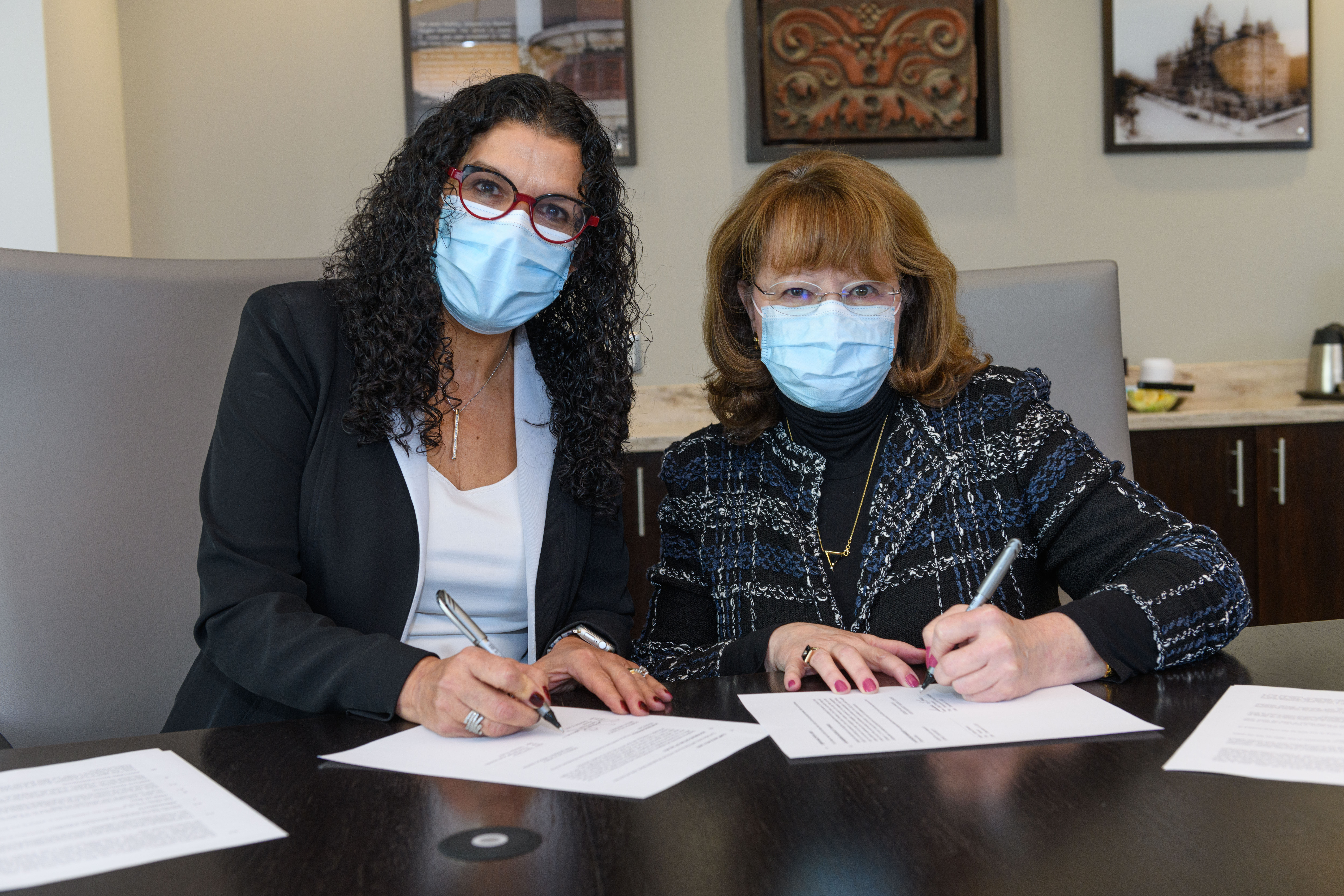 Salma Ghanem (left), DePaul University provost, and Susan Freeman, Rush University provost, signed a memorandum of understanding between the two schools Dec. 10 to expand their collaboration into science, education and technology. (Photo courtesy of Rush University, Steve Gadomski)
Salma Ghanem (left), DePaul University provost, and Susan Freeman, Rush University provost, signed a memorandum of understanding between the two schools Dec. 10 to expand their collaboration into science, education and technology. (Photo courtesy of Rush University, Steve Gadomski) CHICAGO — Building on the success of their partnership in founding and operating the
Center for Community Health Equity, DePaul and Rush universities will expand their collaboration into science, education and technology.
The universities signed a memorandum of understanding in which they agree to explore opportunities for seminars, courses and academic programs as well as research, internships and practicums that draw from their complementary areas of expertise in health science, liberal arts, the humanities, and social and data sciences.
"In our work together on health equity, we have leveraged our strengths, bringing together health care professionals, social scientists and educators to examine the problem from a 360-degree view," said Andrew Bean, PhD, dean of the Graduate College at Rush University and interim vice provost of research at Rush University. "By broadening our relationships across the universities and their respective colleges, we hope to inspire further academic collaboration, exploration and innovation."
“DePaul and Rush have demonstrated the power of collaboration,” said Guillermo Vásquez de Velasco, PhD, dean of the College of Liberal Arts and Social Sciences at DePaul, which houses the Center for Community Health Equity.
“Interdisciplinary inquiry is essential for understanding any complex subject — and there are perhaps no more complex subjects than those found in the intersection of the social sciences and health care,” Vásquez de Velasco said. “We are eager to take our work together into new areas of partnership across the liberal arts and hope similar collaborations can occur with other colleges at Rush and DePaul.”
Since its inception in 2015, the Center for Community Health Equity has supported research and community initiatives and chronicled the political and economic forces behind health disparities, publishing such books as
Community Health Equity. The center is led by co-directors
Raj Shah, MD, associate professor at Rush University, and
Maria Joy Ferrera, PhD, associate professor at DePaul University, and supported by founding co-director, Fernando De Maio, PhD, professor at DePaul University. The center engages faculties from DePaul’s colleges of Liberal Arts and Social Sciences, Science and Health, Driehaus College of Business, Computing and Digital Media, and Communication, and from Rush University’s colleges of Nursing, Health Sciences, Graduate College and Rush Medical College.
Partnering with community organizations, students and faculty, the center has worked to change the deeper narratives that underlie immigrant health, mental health, maternal-child health and healthy aging in order to support the implementation of broader health equity solutions through practice and policy.
“DePaul and Rush have demonstrated how institutions of higher learning can bring scholars together from different disciplines to tackle serious disparities in health outcomes through transformative educational and research programs,” said Susan Freeman, MD, Rush University Provost. “This collaboration will continue to strengthen our joint efforts towards impactful change.”
In addition to the work conducted by the Center for Community Health Equity, DePaul’s Kellstadt Graduate School of Business and Rush’s College of Health Sciences have teamed up since 2007 to offer a joint MBA/MS degree for graduate students. This year, Shah, Rush Assistant Professor Santosh Basapur, and DePaul Professor Marty Martin co-taught a course on social entrepreneurship and health. Also, conversations have been ongoing between faculty in the Graduate College at Rush and the College of Computing and Digital Media at DePaul regarding data science collaborations. Additionally, DePaul’s College of Science and Health send undergraduate students to Rush for a 10-week summer fellowship with the university’s
Autism Assessment, Research, Treatment and Services Center. Other projects are in place or developing.
Rush and DePaul will develop programs and facilitate research interactions, faculty exchanges and other collaborations.
“We are excited to build on our longstanding history of collaborations with Rush,” said Salma Ghanem, PhD, DePaul Provost. “Both institutions have deep roots in Chicago and share a commitment to supporting the health and wellbeing of the people of this city. We feel privileged to work together to advance this core mission in the years to come.”
About Rush University
Rush University is the academic enterprise of Rush University Medical Center. Rush University is comprised of four colleges: Rush Medical College, College of Nursing, College of Health Sciences and the Graduate College. Together they offer more than 40 degree and certificate programs; more than 60 postgraduate training programs for medical residents and fellows; and continuing education options. Rush University System for Health is consistently recognized for our outstanding patient care, education, research and community partnerships. RUSH comprises Rush University Medical Center, Rush Copley Medical Center, Rush Oak Park Hospital and Rush University, as well as an extensive provider network and numerous outpatient care facilities.
About DePaul University
DePaul University was founded in 1898 in Chicago by the Congregation of the Mission (Vincentians), a Roman Catholic religious community dedicated to following the ideals of St. Vincent de Paul, the 17th century priest for whom the university is named. DePaul’s tradition of providing a quality education to students from a broad range of backgrounds, with particular attention to first-generation students, has resulted in one of the nation’s most diverse student bodies. With nearly 22,000 students and some 300 academic programs, DePaul is the largest Catholic university in the United States and the largest private, nonprofit university in the Midwest.
###
Media contacts:
Russell Dorn
312-362-7128 (Desk)
Polly Tita